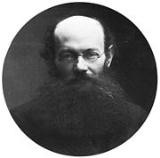
Peter Kropotkin
Overview
Russian Empire
The Russian Empire was a state that existed from 1721 until the Russian Revolution of 1917. It was the successor to the Tsardom of Russia and the predecessor of the Soviet Union...
zoologist, evolutionary theorist, philosopher, economist
Economist
An economist is a professional in the social science discipline of economics. The individual may also study, develop, and apply theories and concepts from economics and write about economic policy...
, geographer
Geographer
A geographer is a scholar whose area of study is geography, the study of Earth's natural environment and human society.Although geographers are historically known as people who make maps, map making is actually the field of study of cartography, a subset of geography...
, author
Author
An author is broadly defined as "the person who originates or gives existence to anything" and that authorship determines responsibility for what is created. Narrowly defined, an author is the originator of any written work.-Legal significance:...
and one of the world's foremost anarcho-communist
Anarchist communism
Anarchist communism is a theory of anarchism which advocates the abolition of the state, markets, money, private property, and capitalism in favor of common ownership of the means of production, direct democracy and a horizontal network of voluntary associations and workers' councils with...
s. Kropotkin advocated a communist
Communism
Communism is a social, political and economic ideology that aims at the establishment of a classless, moneyless, revolutionary and stateless socialist society structured upon common ownership of the means of production...
society free from central government
Government
Government refers to the legislators, administrators, and arbitrators in the administrative bureaucracy who control a state at a given time, and to the system of government by which they are organized...
and based on voluntary associations between workers. Because of his title of prince
Prince
Prince is a general term for a ruler, monarch or member of a monarch's or former monarch's family, and is a hereditary title in the nobility of some European states. The feminine equivalent is a princess...
, he was known by some as "the Anarchist Prince". Some contemporaries saw him as leading a near perfect life, including Oscar Wilde
Oscar Wilde
Oscar Fingal O'Flahertie Wills Wilde was an Irish writer and poet. After writing in different forms throughout the 1880s, he became one of London's most popular playwrights in the early 1890s...
, who described him as "a man with a soul of that beautiful white Christ
Christ
Christ is the English term for the Greek meaning "the anointed one". It is a translation of the Hebrew , usually transliterated into English as Messiah or Mashiach...
which seems coming out of Russia." He wrote many books, pamphlets and articles, the most prominent being The Conquest of Bread
The Conquest of Bread
The Conquest of Bread is a book by the anarchist communist Peter Kropotkin. Originally written in French, it first appeared as a series of articles in the anarchist journals Le Révolté and La Revolté . It was first published as a book in Paris in 1892 with a preface by Élisée Reclus, who also...
and Fields, Factories and Workshops
Fields, Factories and Workshops
Fields, Factories and Workshops: or Industry Combined with Agriculture and Brain Work with Manual Work is a landmark anarchist text by Peter Kropotkin, and arguably one of the most influential and positive statements of the anarchist political philosophy. It is viewed by many as the central work of...
, and his principal scientific
Science
Science is a systematic enterprise that builds and organizes knowledge in the form of testable explanations and predictions about the universe...
offering, Mutual Aid: A Factor of Evolution
Mutual Aid: A Factor of Evolution
Mutual Aid: A Factor of Evolution is a book by Peter Kropotkin on the subject of mutual aid, written while he was living in exile in England. It was first published by William Heinemann in London in October 1902...
.
Quotations
You know how I always believe in the future ... Without disorder, the revolution is impossible; knowing that, I did not lose hope, and I do not lose it now.![]()
Letter to a friend (November 1920), as quoted in Peter Kropotkin : From Prince to Rebel (1990) by George Woodcock and Ivan Avakumovic, p. 428

